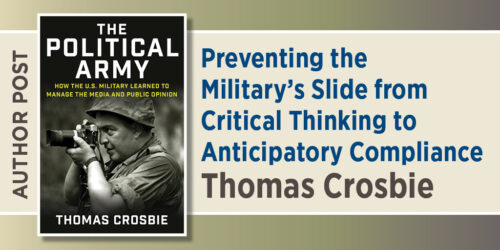Aaron Belkin on Sexual Violence in the U.S. Military
“Respect for the troops is important. But when respect turns into uncritical idealization, that can easily slip into a mode of thinking in which people assume that what’s good for the military is good for America.”—Aaron Belkin
In a recent interview with Time‘s blog Battleland , Aaron Belkin, author of Bring Me Men: Military Masculinity and the Benign Façade of American Empire, 1898-2001, discusses a range of issues including sexual violence in the U.S. military, the dangers of idealizing the armed forces and soldiers, and .
He begins the interview by discussing how his own efforts to repeal “Don’t Ask, Don’t Tell,” (DADT) led to him writing Bring Me Men. He wrote the book, in part, to apologize for his activism to end DADT required him to glorify the military and U.S. foreign policy. Belkin argues that an unthinking glorification of the troops leads to a greater militarization of U.S. society. He worries that an assumption that what is good for the military is good for the country leads to a militarization of society, greater spending on defense, and a greater willingness to go to war.
In terms of sexual violence in the U.S. military, Belkin conservatively estimates that there are 2,200 incidents of male-male each year. The military’s hierarchical structure creates a slave/master dynamic and when combined with its emphasis on violence, the likelihood of rape increases. Belkin argues that the emphasis on masculine culture leads to a silencing of this issue:
The male warrior is supposed to have a completely impermeable, sealed-up body that cannot be penetrated by anything. But at the same time, male warriors are often expected to endure rape, to “take it like a man.” And, these opposing expectations illustrate the broader range of contradictions associated with military masculinity, in that troops are expected to be masculine and feminine, civilized and barbaric, dirty and clean, and so on.
Belkin concludes the interview by discussing how the repeal of DADT has affected the military. He argues that it has been relatively seamless:
The troops were already serving with gays, so repeal didn’t change anything on the ground. Prior to repeal, the Pentagon found that of the roughly 70% of service members who had served with gays and lesbians, more than 90% said that they did not have a problem doing so. And that included Marines and other combat troops.
Following repeal, gays and straights have continued to behave professionally, as has always been the case. And, Pentagon leadership has insisted that regardless of personal feelings, the troops must work together and follow the same set of rules. That’s why repeal has gone so well.




1 Response